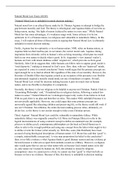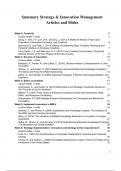Essay
Essay answer to "Natural moral law is an unhelpful theory for decision making." Discuss. 40/40, marked by Teacher
- Vak
- Instelling
Essay is full marks, 40/40 and under 1000 words (so it's super easy under timed conditions) A lot of people i know struggle with the structure of an ethics essay, so this is extremely clear and simple. Explains 1. natural law as too optimistic of human nature 2. natural law as too religious 3....
[Meer zien]




